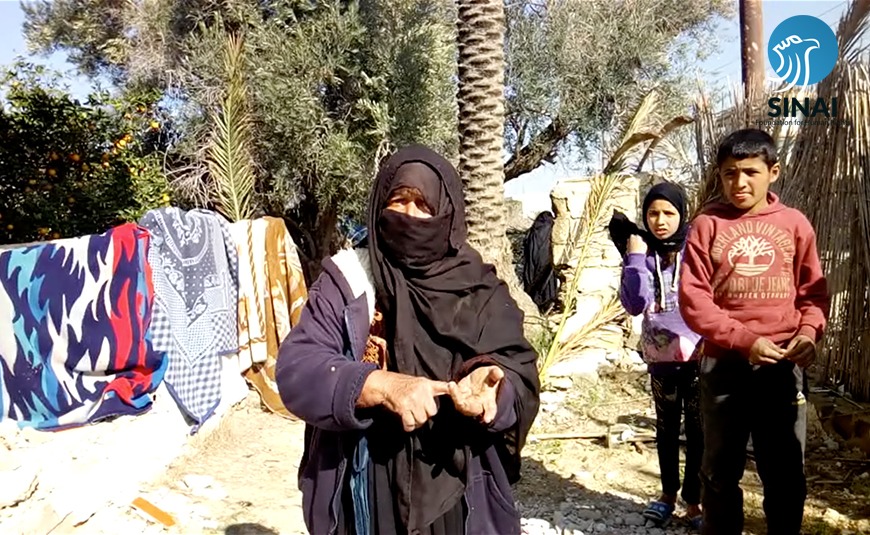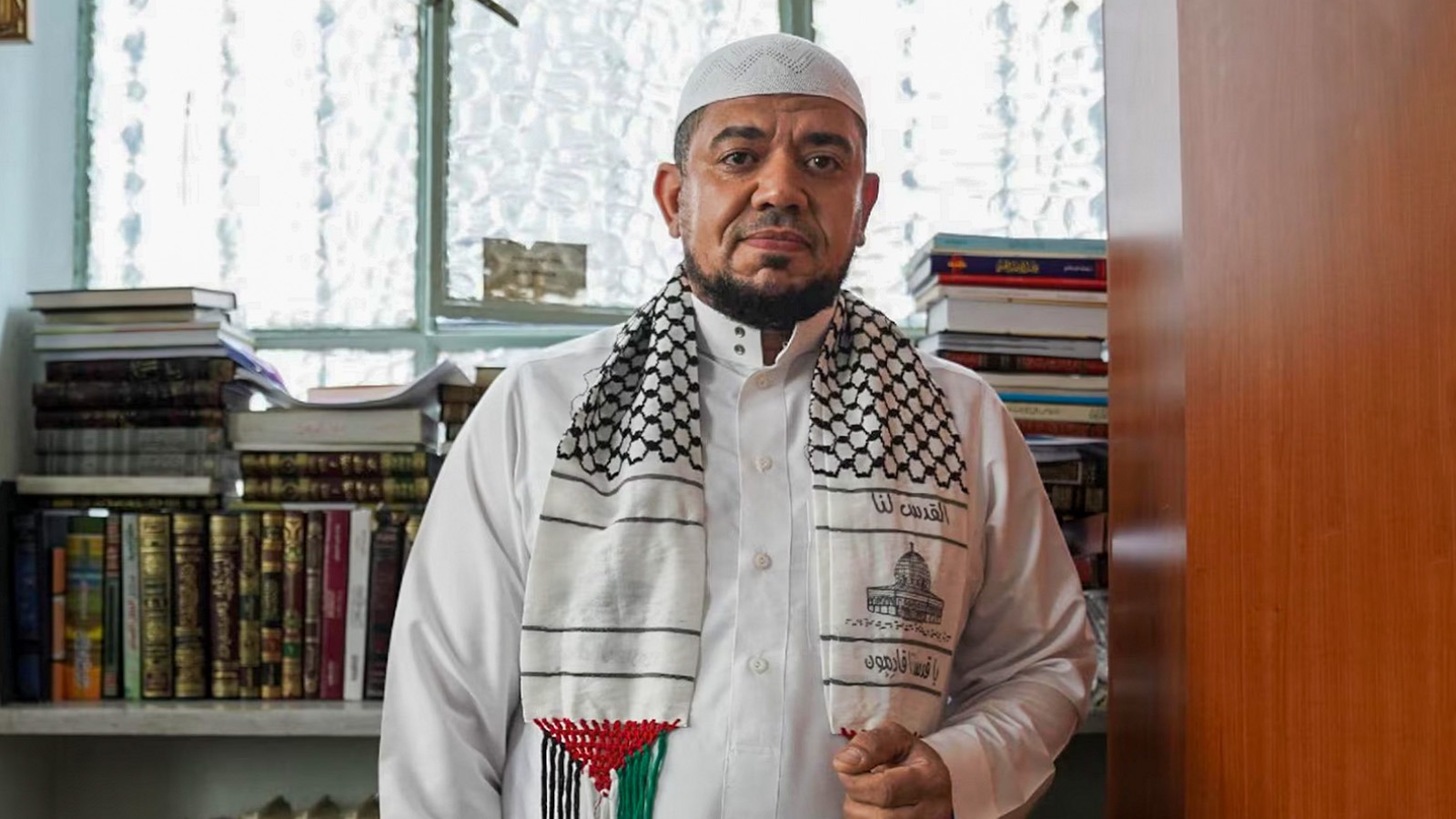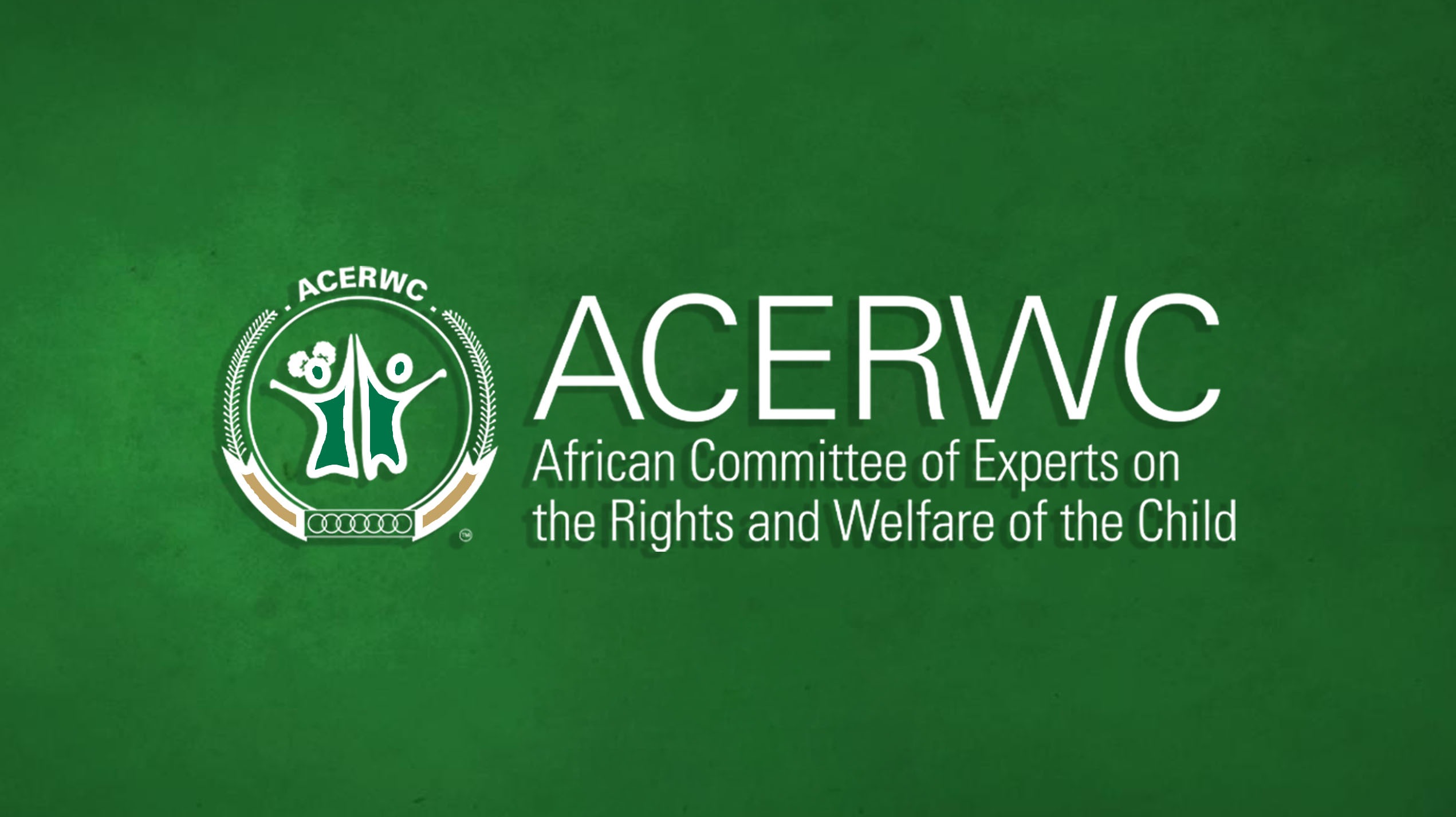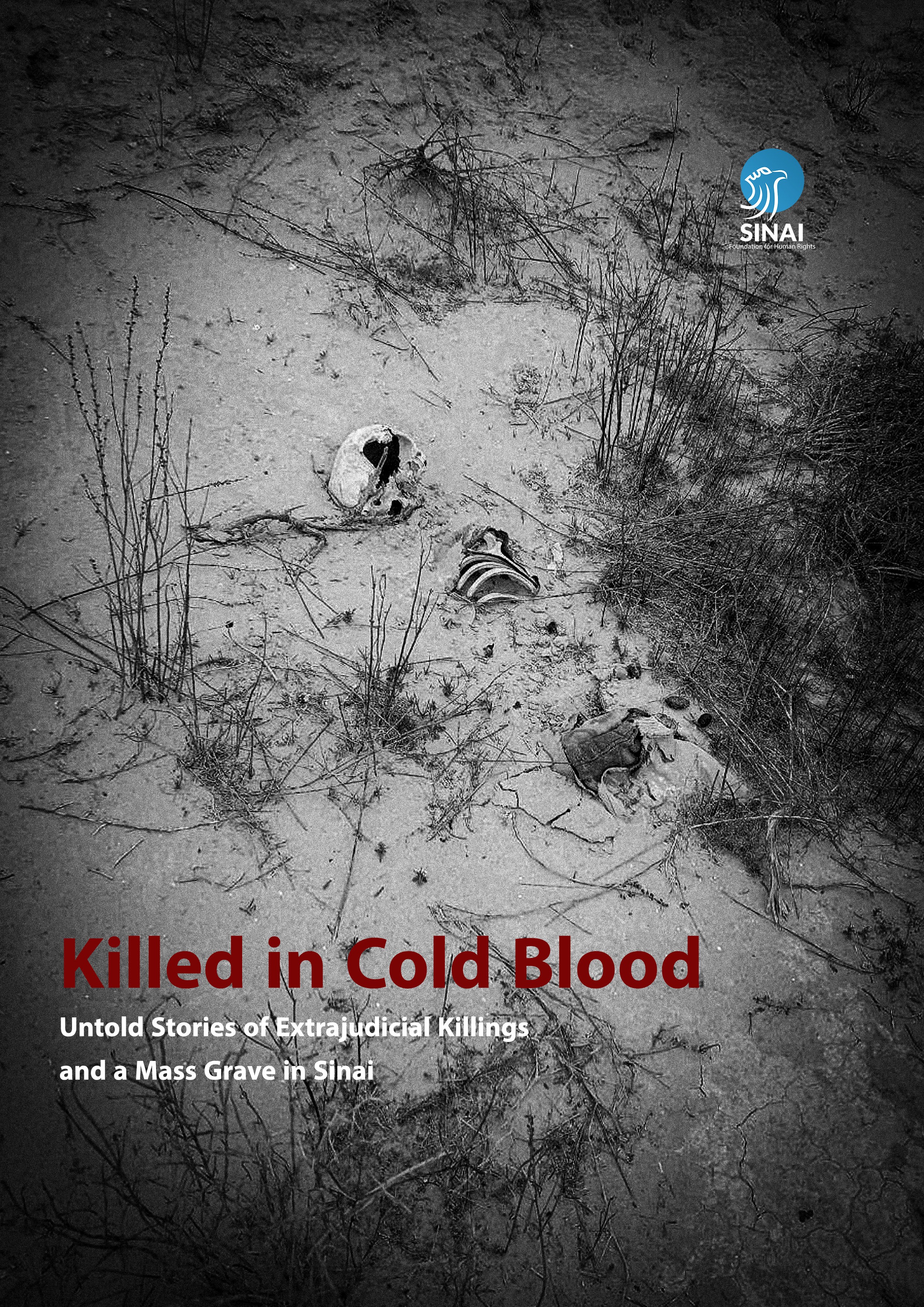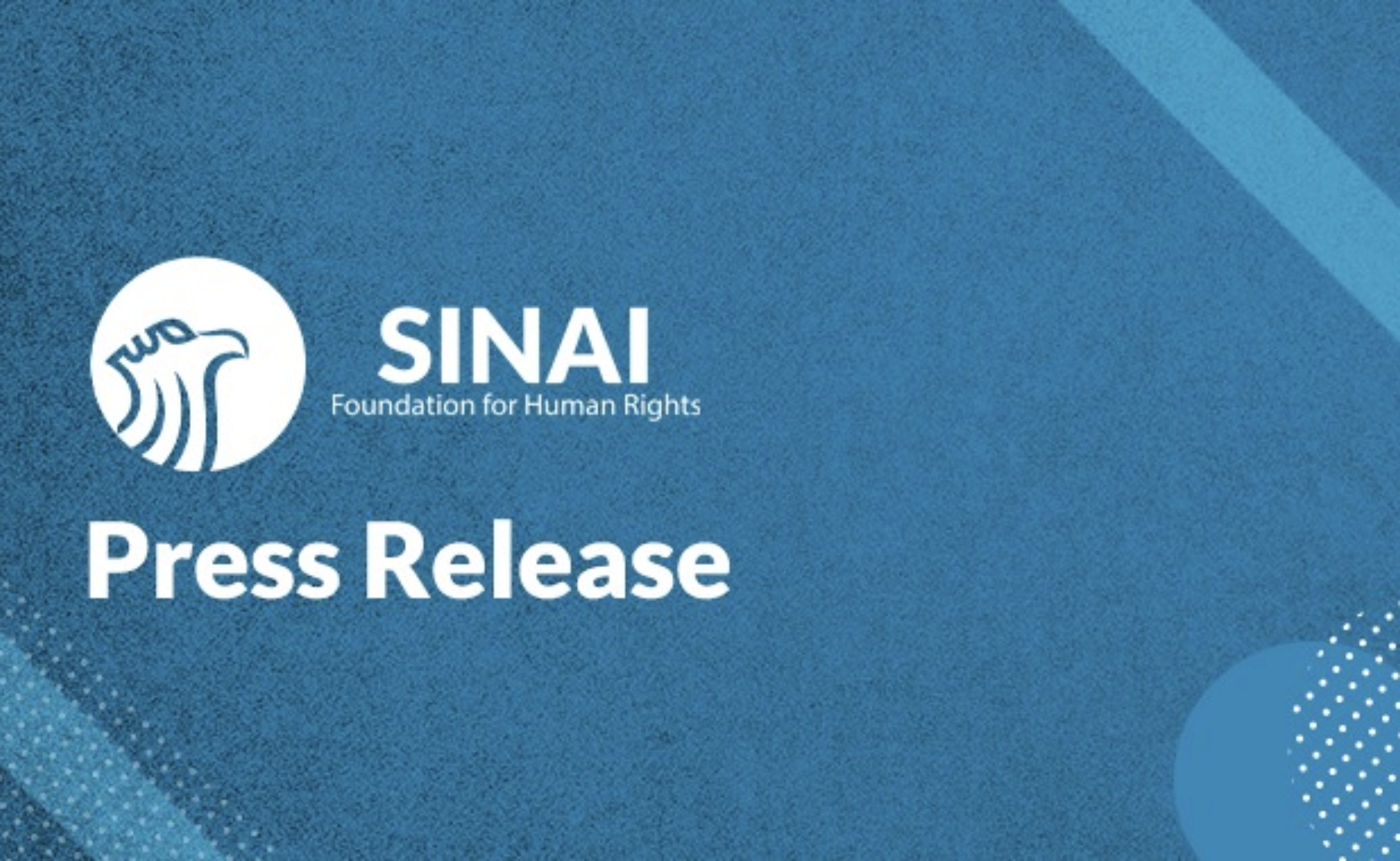“I swear to God, we are sick and tired of our lives. Death seems better than the humiliation we face.”
*A farmer evicted from Rafah in 2014, living in an enclosure in Bir al-Abd
Summary:
The Sinai Foundation for Human Rights has recorded 7 abuses during this month, most of which took place in Bir al-Abd, followed by al-Sheikh Zwayed, in addition to recording 16 eyewitness reports and local citizen testimonies. Arbitrary arrests and group punishments targeted at evicted al-Sheikh Zwayed and Rafah locals, currently residing in Bir al-Abd, took place at the beginning of the month, as a result of the abduction of a Christian civilian by militants appearing to be part of ISIS on 08.11.2020. The second week of the month has seen the murder of a 68-year-old man after being shot by a military force stationed near the al-Sheikh Zwayed police station. The foundation has also recorded the arbitrary detention of a woman by the military with no legal basis or justification.
On another side, two pillaging incidents of civilian properties by Sinai Provence militants in al-Sheikh Zwayed were reported, where they took food and supplies belonging to a number of locals. In addition to the murder of civilians claimed to have supported the security forces in capturing group militants in Bir al-Abd. The abduction of others, some of whom were later released was also recorded.
In the last week of the year, the Sinai Foundation has also reported the abduction of 3 fishermen by the group for unidentified reasons.
Details of the abuses
A-Egyptian authorities and law enforcement forces abuses
Citizens evicted from al-Sheikh Zwayed and Rafah are target of unjustified arbitrary arrests in Bir al-Abd1.
This month, the Sinai Foundation for Human rights has recorded discriminatory abuses based on identity targeted at citizens evicted from Rafah and al-Sheikh Zwayed to Bir al-Abd. Testimonies showed that the Egyptian authorities took arbitrary punitive measures toward evicted citizens in a campaign that goes against the governing laws and costumes. The working group concerned with arbitrary arrests in the United Nations has stated in the guidelines related to arrest and detainment adopted in 9 December 1988, that deprivation of freedom must not be based on discriminatory basis, like religion, identity, race, religious views, sex, or national or social or birth origin, according to principle 5 of the declaration. As they have also blatantly stated the requirement for reasons for the personal arrest, according to principles 11 and 12.
On 03.12.2020, the security authorities continued the arbitrary arrest campaigns against citizens of Bir al-Abd that in the first week of December affected the citizens evicted from al-Sheikh Zwayed and Rafah living in the city. Those campaigns were a part of the group punishments aimed at civilians as a result of the abduction of one the city’s Christian citizens called “Nabil Habashy Salama” by militants believed to be part of ISIS on 08.11.2020 by his house in al-Ghizlan neighborhood in Bir al-Abd. The Sinai Foundation for Human Rights has recorded the details of the incident and what followed in arbitrary actions in its November report.
The identity-driven arrests started after the abduction of the Christian citizen and they targeted evicted citizens residing in the city after different waves of eviction.
A farmer evicted from northern al-Sheikh Zwayed to Bir al-Abd in 2018 said:
“I was standing before a grocery store in the “al-Gjizlan” neighborhood in northern Bir al-Abd and I saw government vehicles including armed vehicles and police cars all over the area. Police officers dressed in civilian clothes and other dressed in official uniforms got out of the cars carrying guns and pointing to the street entrances. Then they started spreading around, searching everyone that passed by them and checking people’s IDs and asking which tribe they belonged to, where they’re living and whether they have neighbors from Rafah and al-Sheikh Zwayed. Those who randomly happened to be from al-Sheikh Zwayed or Rafah were put in a blue transport car that was with them.”
The witness added: “They even took young high school kids on their way to classes. This went on from morning till afternoon. Once the blue car was full, the detainees were taken to the police station and the car would be brought back for more detainees. My cousin’s son was taken on December 2nd, 2020 when he was traveling through the Bir al-Abd ambush, they made him get off because he’s from al-Sheikh Zwayed. He was on his way to relatives in al-Kassassin where he works as a hired farmer. We were told that he’s in Bir al-Abd police station. We sent him food and drink with a friend who knows local policemen at the station. One of the policemen told him that the boy is to stand before the National Security in al-Arish, and that when they know what that leads to, we’ll know what his fate is going to be. Either to be transported to al-Arish or to be released.”
That witness adds: “We heard the same story happening throughout the outskirts of the city, and of course most of those areas’ inhabitants are those evicted from al-Sheikh Zwayed and Rafah, living in coops or enclosures where they build kiosks or live in simple houses where they pay lower rent than those in the city center. Most of those people are employees or those making a living from livestock or bird breeding, some of whom are from the al-Sawarka or al-Ramilat tribes.”
The previous testimony aligns with that of another witness, a government employee who moved from al-Thahir village in southern al-Sheikh Zwayed to Bir al-Abd in 2017 as a result of endangerment to his and his family’s lives due to drones and indiscriminate shootings:
“I sometimes contact the police station in Bir al-Abd to ask about people detained for suspicion, and through talking we find out whose names get sent to National Security, and that the station is just a place for holding, and that those detained are just held there tell the National Security give an answer about them. If they want any of the detainees, they get sent to al-Arish, if they do not, the detainees are released from the station. Sometimes, when there is a new investigating officer, arrest campaigns of evicted citizens are carried out, and the arrested are detained for one to four days. They are then released when the elders of Bir al-Abd tribes intervene after we ask them for help when something like that happens.”
Another farmer working as a day laborer, living in an enclosure temporarily given to him by a Bir al-Abd local where he settled after arriving from Rafah in 2014, told the Sinai Foundation for Human Rights team:
“The security forces passed by here in armed vehicles full of police officers, no military. They searched the enclosure, looking through boxes and cabinets. They took the details of everyone and asked for copies of our ID cards for the police station. They didn’t take anyone, but they kept asking about our relatives in Rafah, if we’ve seen any terrorists, and whether any of our family members are wanted by the police.
Maybe the officer felt bad for us when he saw our state, but we have heard that they took some of the evicted people from houses close to ours.”
He added: “I swear to God we are sick and tired of our lives. Death seems better than the humiliation we face. We are dealing with living in poverty, but for them to also humiliate us like that! We also heard that a new officer trying to prove himself and his presence in the area is behind what is happening. And he could only find us, the poor, to show off to.”
A civilian released from the police station after 4 days of being detained after being arrested from a street in Bir al-Abd told the Sinai Foundation for Human Rights team:
“I was on my way to the market to buy vegetables for the house and a police car and armed vehicle passed by me on the street. A man in the passenger seat of the armed car dressed in civilian clothes, he was probably an investigator, said: ‘Hey, kid! Show me your ID card’, and when he saw the word al-Sheikh Zwayed on the card, he shook his head and said: ‘You’re from al-Sheikh? What tribe?’, I told him “Sawarka”. He then called on a member of the security forces who got out of the police car and armed vehicle and told them to take me. For 4 days I was detained in a cell full of people, maybe over 20 people in a small room. To be fair, they did bring us food, and our families sent us food too. The security personnel told us that we’d be released after the investigations, which will show who is wanted, and those who aren’t will be released. On the third day according to our knowledge, some Bir al-Abd elders came to the station and were told that we’d be investigated then released. There were no investigations except for taking personal information, which tribe we’re from, and who our relatives are. We were forced to say everything. They threatened us that if we didn’t tell the truth, they’d send us to the National Security.”
Ahmad Salama, a member of the “al-Sawarka” tribe stated on his Facebook profile that there are security issues facing the evicted in Bir al-Abd where he lives after being evicted from his village, al-Thahir, in northern al-Sheikh Zwayed after 2017. He pointed to the existence of around 200 evicted families suffering hardships and siege and having the roads around them blocked. He said that the official authorities, including the city council and governor and director of security, have abandoned them, and that they are not willing to listen to their complaints.
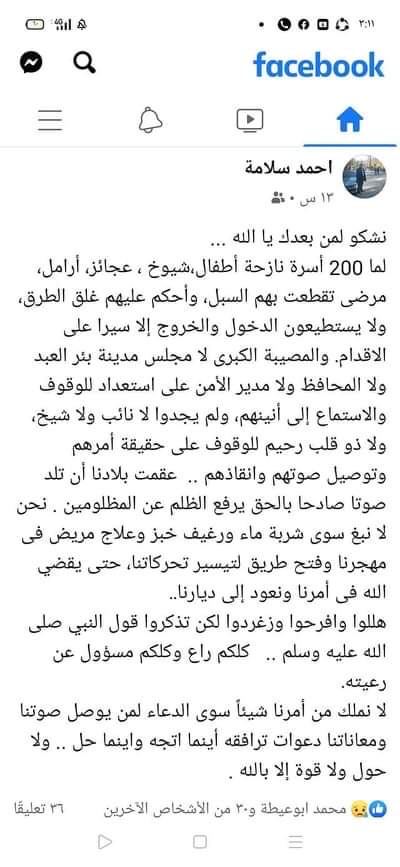
Extrajudicial killings in the city of al-Skeikh Zwayed2.
Arbitrary deprivation of the right to life is considered to be a violation to human rights. The right to life is warranted in the Universal Declaration of Human Rights, article 3, and in article 6 of The International Covenant on Civil and Political Rights. Therefore, it is not allowed to use exceptional circumstances as an excuse to overstep those boundaries.
Killings carried out by the law enforcement forces outside the state of armed conflict require the opening of an immediate investigation and bringing the accused before a judge in preparation for their prosecution and receiving a fair decision that does the victims and their families justice. Except that does not happen in Sinai. The authorities do not take those steps, instead they deliberately waste the victims’ rights by writing the incidents up as against persons unknown, which loses the victims or their families any rights proportionate with the incident, in addition to protecting those responsible from any judicial accountability.
The killing operations carried out by the security and military forces outside the area of combat operations are subject to the basic United Nations principles on the use of force and firearms, which are firm, obligatory rules that blatantly impose the must to respect the right to life.
On 08.12.2020, an elderly civilian in his 60s called “Salama Aboul-Abd Abou-Houishil” was shot and killed by a military force stationed in al-Sheikh Zwayed town square near the city police station.
One of the local citizens who heard the gunshots and went to the hospital said: “At around 6 in the morning of December 8th, we heard gunshots coming from the east, from the direction of the police station. We’re used to the sounds of gunshots from all ambushes day and night. We didn’t know that those gunshots had killed Hajj Salama until we were told by the people who moved him to the hospital.”
He added: “Most of the people went to the hospital, and we found Hajj Salama dead and covered by a blanket. They wanted to send him to the al-Arish Hospital morgue to start the burial procedures, like they do every time there’s death by gunfire.”
The witness added: “Hajj Salama was around 68 years old. He was part of al-Hawashla family living in al-Sheikh Zwayed. He had been a merchant, then as he got older, he got sick and his hearing became worse. He was even mentally unwell. He sometimes went to the healthcare unit in the outskirts of al-Sheikh Zwayed near the police station. Military forces are heavily present around the town square, searching cars. It’s not allowed to walk through the square, it’s been closed off since 2013 after the explosion of a booby-trapped car. Even shops are closed there. But they allow cars from and to al-Arish to pass through after being searched. The healthcare unit is located in the square, and they allow people to go there through a side-street. The unit opens at 8 in the morning. Hajj Salama was a poor man and he went out early, even his family don’t know where he was going after 6 in the morning when the curfew that starts from 7 in the evening till 6 in the morning was lifted.
A civilian living close to the city of al-Sheikh Zwayed told the foundation team: “When the military officers saw Hajj Salama walking toward the healthcare unit, they kept calling for him to stop. Apparently, he did not hear them and kept on walking so they fired shots in the air, and when he kept on walking, they shot him. He died instantly. They called an ambulance and moved him to al-Sheikh Zwayed hospital.”
He added: “The square is terrifying! The police station is surrounded by tanks and concrete fences, and snipers are spread out on the roof, and military vehicles are everywhere around the square, along which soldiers whose guns are always aimed at the passing cars, despite the fact that they get searched 4 times before being allowed to pass through the square. Also, the destroyed buildings around the square don’t look that different from the scenes we see of Syria. Total destruction of buildings and shops.”
We talked with another local witness, an employee in the city health sector, about the procedures carried out in case of the murder or injury of civilians by law-enforcement gunshots. He said: “After the body is transported to al-Arish hospital, it has to be taken to Port Said so the coroner doesn’t have to come to al-Arish, and this takes time and costs money to transport the body to Port Said and back to obtain a burial permit.
Of course, there are no accusations. The files are sent to the prosecutor’s office and we don’t know what happens next except that people get copies of the records to apply for financial compensation as relatives of the deceased, then the accusation is recorded as against persons unknown.”
The testimonies show that the shooting at an elderly man was deliberate, and with intention to kill, not stop until it is checked how dangerous he was. In addition to the fact that the state of the man’s health and age blatantly show that he posed no threat to the military forces, and despite that, deadly force was immediately used against him in violation of the Principle of Proportionality mentioned in the International Humanitarian Law, which identifies the legitimacy of certain actions according to the respect of the balance between the aim, the means used to reach it, and the consequences of the action.
In this incident specifically, and according to the context of the event and its circumstances, the victim was not a threat, and other ways of stopping and warning him could have been used instead of shooting to kill, which classifies this incident as an intentional extrajudicial murder.
Arbitrary detention of a woman in al-Shiekh Zwayed3.
A teacher was unjustifiably detained for three days in a military camp with no legal or legitimate reasons for deprivation of liberty, which makes this action a forced detention, which is unaccepted by the International Covenant on Civil and Political Rights that states in article 9 that: “Everyone has the right to liberty and security of person. No one shall be subjected to arbitrary arrest or detention. No one shall be deprived of his liberty except on such grounds and in accordance with such procedure as are established by law.”
On 25.12.2020, a teacher called “Tahany Ibrahim Mohamed al-Kaim”, who works in al-Sheikh Zwayed department of education, revealed that she was detained with no legal basis or cause in the battalion 101 camp for three days, after she was arrested at the ambush in the village of al-Maidan around 15 meters west of al-Arish, controlled by a mixed force of police and military. She stated in a status update posted to her Facebook profile that she was released after an intervention from elders and members of the Egyptian parliament.
According to a statement made by one of her colleagues who preferred to keep their identity secret, Tahany’s older brother was victim of enforced disappearance in 2014, after being taken from his house in al-Sheikh Zwayed by a military force. He was then transferred to the 101 battalion’s base, then to al-Galaa camp in Ismailia, before he completely disappeared. Tahany’s colleague stated that the teacher’s arrest is related to her brother’s disappearance, as the security forces intentionally harass the families of detained or forcibly disappeared individuals by stopping them at military and police ambushes on the roads of North Sinai, or at tunnels and Suez Canal ferries, in a method they have been using for years.
He added: “Many people stopped traveling so they wouldn’t be punished for being related to someone the security forces are interested in. The problem is that the people who disappear are held by them and only God knows what’s to become of them. People are suffering. Many families have such sad stories about disappeared detainees. The problem is that there’s no coordination between the police and the military. The police would ask about someone who’s detained by the military, then ask what proof you have that they’re being detained by the military, when the military don’t give any information about the forcibly disappeared, and even deny having them.
He added: “What happened with Ms. Tahany is such a shame. How could they make a teacher get out of a car, interrogate her, put her in an armored car in front of everybody, then detain her in a military battalion! Can you imagine how she must have felt in this situation? Where are the representatives? Where is the law?”
According to the testimony and the similar incidents recorded by the Sinai Foundation, enforced disappearances are common is Sinai. They are also a crime prohibited by international human rights instruments and international conventions on the protection of all individuals from enforced disappearances, which is considered to be one of the strongest human rights treaties adopted by the United Nations and put into motion in 2010. The treaty states that it is not permissible to subject anyone to enforced disappearance, and no exceptional circumstances can be used as an excuse, be it war or the threat of war or internal political instability, or any other exceptions. It is worth mentioning that “enforced disappearances”, arrests, detention, abduction or any form of deprivation of liberty performed by government officials, or individuals or groups acting with permission or support from the government, followed by refusal to admit to depriving a person of their liberty or hiding the disappeared person’s status or their whereabouts, deprives them of the protection of the law.
2. ISIS-affiliate group, Sinai Province, abuses
1- Intentional extrajudicial killings in Bir al-Abd
The Geneva conventions concerned with armed conflict have agreed in article 3 on the prohibition of “violence to life and person, in particular murder of all kinds” of civilians. The four conventions consider “intentional murder” of protected individuals as a huge violation. All conventions concerned with human rights have also blatantly prohibited “arbitrary deprivation of the right to life”. The ISIS-affiliate group, Sinai Province, is one of the conflicting parties in Sinai, and the principles and rules stated by international treaties concerned with national and international conflicts apply to the group.
On 14.12.2020, the ISIS-affiliate group, Sinai Province, killed the citizen “Jumaa Mohamed Suliman”, less than a week after abducting him from the “Sahl al-Tina” area. According to the statement published by the group on Twitter, “Jumaa” was executed for allegedly helping security forces capture three members of the group.
In addition to that, the group has also confessed to killing the citizen “Saqr al-Masoudy” in front of his house in “Gilbana” village, Ismailia, on 13.10.2020, as the other murder victim’s partner in capturing fighters from the group, according to what was published in ISIS’s al-Naba newspaper. The Sinai Foundation for Human Rights has recorded the details of al-Masoudy’s murder and published them in October’s human rights report.
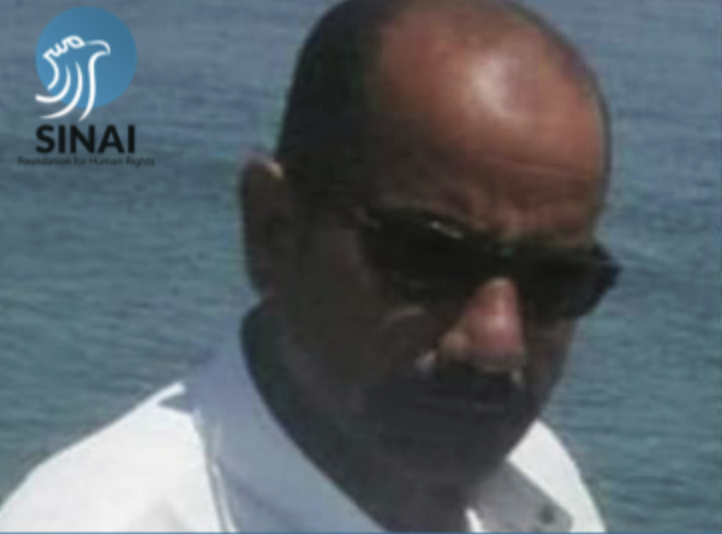
2- The pillaging of citizens’ food supplies in two areas in al-Sheikh Zwayed
The pillaging of properties and money belonging to civilians is a crime where the doer should be punished. The additional protocol (II) to the Geneva Conventions, 1977 prohibits said crimes. The status of the International Criminal Court shows that pillaging is a “war crime” during international armed conflicts, and according to it: “The pillage of a town or place, even when taken by assault” is a war crime during non-international armed conflicts. The international custom and behavior, and countries that lived through a state of armed conflict show that pillaging is considered to be a crime during any armed conflict.
On 15.12.2020, civilians in al-Thahir village lived through terrifying circumstances when Sinai Province militants raided their houses and pillaged their supplies.
The militants intentionally forcefully took food supplies from houses.
The Sinai Foundation for Human Rights spoke to two locals from the village. One of them said: “Around one in the morning, we heard movement and people knocking on our door. I opened the door and saw 4 armed men, and from the first glance I knew they were from ISIS. They said they wanted any flour or food we have in the house. Of course, there was no time to argue or even speak. I told them where the flour was. All we had in the house was a sack of flour that wasn’t even full, some sugar, rice and oil from last month’s provision and some vegetables, and they took them all and told us that we can buy more. I learned after they left the village that they went to more than one house and took all the flour and provisions in the houses of the village.”
Another eyewitness stated: “We counted more than 20 ISIS members whose dialects sounded like they’re from Sinai. Some of them guarded and secured the area, while others went into houses and took the provisions and flour. They took three mule-drawn carts from the villagers to use for transporting the supplies. I swear, it takes so much effort to be able to get a bag of flour inside the village, because the military prohibit us from buying many food supplies, because they think that we might give them to ISIS, so ISIS members came themselves and took our provisions. The next day, we reported what happened to the al-Goura ambush, and truth be told, they allowed us to buy flour instead of that the ISIS members stole.”
He added: “I swear to God, our lives are terrible. We’ve been trying to stay for years, despite the war and restrictions. We don’t want what happened to the evicted to happen to us, the humiliation. Can you imagine that those living in al-Thahir are considered to be suspicious? How is that possible when the ISIS members stole from us and took our children’s food? Only God knows how we can afford that food and how we transport it on mules for almost 3 kilometers from the village of al-Goura, because cars aren’t allowed inside al-Thahir.”
Since 2018, as a result of the comprehensive operations in Sinai, the daily life in North Sinai has been restricted in a way that hindered the daily lives of citizens. The amounts and types of food supplies and goods that are allowed to cross into the cities or villages of the governorate have been restricted. The authorities have also mandated the prior planning with them for bringing supplies into some areas and limited the amounts of fuel citizens are allowed to buy for their houses and cars, in addition to the curfew imposed since the 24th of October 2014 which is still standing till now. The Sinai foundation has published a statement about the curfew on its 6th anniversary.
This incident didn’t only take place in the village of al-Thahir, but also happened again on the dawn of December 21st in the eastern outskirts of the al-Kawthar neighborhood in al-Sheikh Zwayed. At three in the morning, more than 17 armed ISIS militants snuck into the neighborhood and knocked on a number of doors while carrying guns, in a scene that terrified the civilians.
One of the neighborhood’s inhabitants said: “I heard a knock on the door, I wondered who would be knocking at such time. I thought maybe one of the neighbors was sick or something. I opened the door and found two armed men with walkie-talkies hanging on their chests, saying in a low voice to take all the flour and food they could find. I was so scared that I got them everything that was in the house right to the door. One of them brought out 300 pounds, saying: ‘This is the price of the things we took from you’
I didn’t know what to say or what to do. I was petrified and too scared to leave the house to see what was happening outside. The next morning, I learned that the Takfiris came into the neighborhood and took all the food from 7 houses, and that there were 17 of them and they took two mule-drawn carts from the villagers to transport the stuff, and then headed east toward Rafah. The strange thing is that the ambushes kept firing indiscriminate gunshots after the Takfiris left but didn’t try to follow them.”
In another statement given by a woman that described her experience as a hard time and severe fear that led to her having a nervous breakdown till the next day, she told the Sinai Foundation team: “My children and I were terrified. It was the first time we saw Takfiris. We were scared they would kill or slaughter us. God protected us and they only took the provisions we had in the house.”
She added: “One of them told me to get all the food we had in the house. Without noticing, I found myself running and putting all the food in the house before him. I did not leave anything behind because I was so scared. How did they make it into al-Kawthar when the neighborhood is surrounded by ambushes?”
3- The murder of a civilian after being abducted by the group in Bir al-Abd
The locals found the body of the citizen “Mohamed Hassan Salim Shabana” in a farm on 10.12.2020. He had been abducted my ISIS militants on 24.07.2020 while passing through a security checkpoint set up by the group near the village of “Qatia”. According to one the victim’s relatives interviewed by the Sinai Foundation in July 2020, “Mohamed Hassan Salim” was arrested by the group after the militants asked him to present his ID card and saw that he had previously worked as a civilian employee in the Ministry of Interior. They then arrested him and confiscated his car. The Sinai Foundation has recorded the details of the incident in its July report.
Mohamed’s direct cause of death is not known. There are no signs of torture or gunshot wounds on the body, but he probably died because of not taking his medications after being abducted by the group, in addition to the hard circumstances he went through at the time of the abduction.
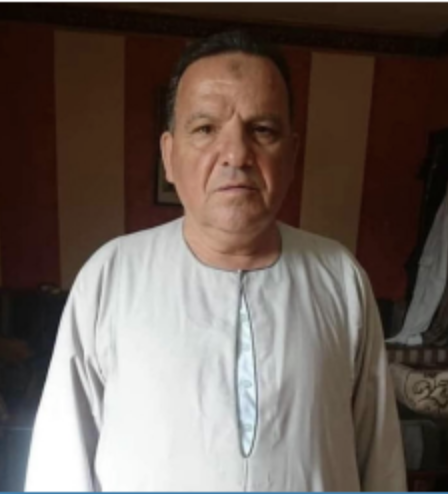
We talked with a local eyewitness in Qatia about the details of finding the body that was later moved to the Bir al-Abd general hospital, he told us: “When our neighbor was in his farm, he noticed an area the size of a grave that had been dug up then filled back up. He noticed it because the soil had a different color. He got suspicious and called on a group of our neighbors, I was one of them, we dug up the grave and found Hajj Mohamed’s body. May his soul rest in peace.
We recognized Hajj Mohamed at once because he didn’t look very different, there were no signs of torture or gunshot wounds. It seems like Hajj Mohamed couldn’t handle the circumstances of his abduction. And he had diabetes and high blood pressure, I think he must’ve died because he wasn’t taking his medications.”
Mohamed’s abduction is a sample of ISIS’s actions that do not respect the rules of non-international armed conflict, by intentionally targeting civilians under any excuse. The victim was not part in any military activities, and his previous job in the Ministry of Interior was a civilian, non-security role. These variables show the abduction as a crime to be added to a record of abuses committed by the Sinai Province group against civilians.
4- The abduction of 3 fishermen in Bir al-Abd
The rules of conflict stress on the wrongfulness of assaulting civilians, and prohibit targeting them in general, and it is a binding principle for all sides of a military conflict, both in and outside of Egypt. It includes government forces and the ISIS-affiliate group, Sinai Province. The Principle of Distinction between Civilians and Combatants is recognized in the International Humanitarian Law, as it is a foundation of the rules of conflict, that dictates aiming attacks on combatants only, not civilians. This principle has also been stated in the United Nations General Assembly resolution, published in 1968, about respecting human rights during armed conflicts by applying the Principle of Distinction during all armed conflicts.
Despite all that, unknown armed men abducted 3 fishermen working in al-Bardawil lake when they were returning from work in their car and they passed through the village of al-Tlul on 23.12.2020. Their whereabouts have not been found and no conflicting side has officially claimed the abduction, but it is believed that the Sinai Province group is behind it.
According to data acquired by the Sinai Foundation from local sources, the three civilians from the village of “Romanah” in Bir al-Abd, northern Sinai are:
-
Mohamed Ali Muhaisen
-
Hassan Ali Muhaisen
-
Ali Ammar Muhaisen
According to the locals, 3 hooded armed men with machine guns stalked the car close to the village of al-Tlul, stopped the car at gunpoint and got in, before order the driver to go toward the south of the village to the desert where they vanished.
ISIS’s reasoning behind abducting the 3 fishermen is unknown, as the chain of abductions carried out during the fourth quarter of 2020 shows a variety in targets. On 08.11.2020, a Christian citizen called “Nabil Habashy Salama” was taken from in front of his house in Bir al-Abd on religious basis, as well as the abduction and murder of a citizen called “Jumaa Mohamed Suliman” on 14.12.2020 for his alleged cooperation with security forces.
Recommendations:
-
To the Egyptian authorities
-
Conducting transparent investigations into the incidents in which members of the military and security forces were part, that led to the fall of civilian victims.
-
Lifting discriminatory and illegal restrictions off business and fishing and movement in Sinai and offering immediate and fair compensations to citizens who were harmed by said restrictions.
-
Complying with principles of the International Humanitarian Law by the military and security forces is an important basis that guaranties professionalism in performing their duties. Officers and military personnel should be taught those rules and trained to abide by them through curricula in the military academy and other training courses.
-
Inviting and accepting visitation requests from UN special procedures mandates to Sinai, and allowing them unhindered access, and guarantying the safety of those who cooperate with them from punishment.
-
Modifying laws and systems that grant unlimited authority to the security and military forces, including the state of emergency and the counterterrorism law, and implementing mechanisms that guarantee judicial and legal supervision on law-enforcement authorities.
-
To all conflicting parties, including Sinai Province militants:
-
Taking all possible precautions to protect civilians, according to the International Humanitarian Law, during any military land or air raids.
-
In areas where the unlawful side to the conflict is the ruling force, all necessary precautions are to be taken to protect the rights of all inhabitants without discrimination and ensure all basic needs of civilians.
Related Postes
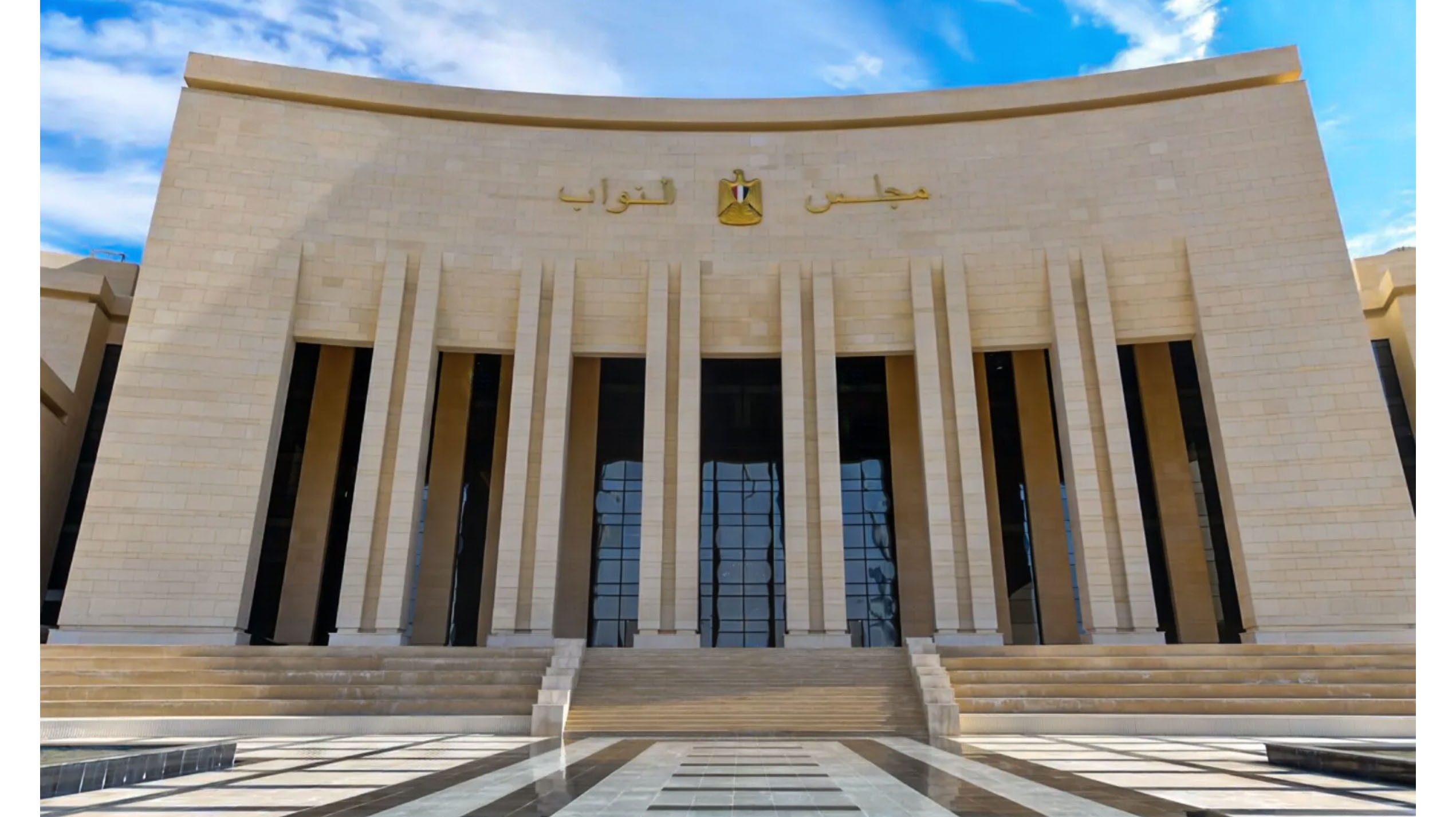 English content
English content

